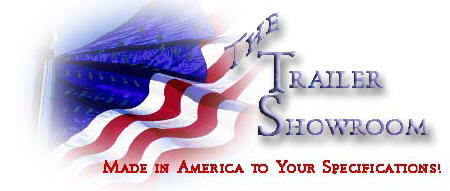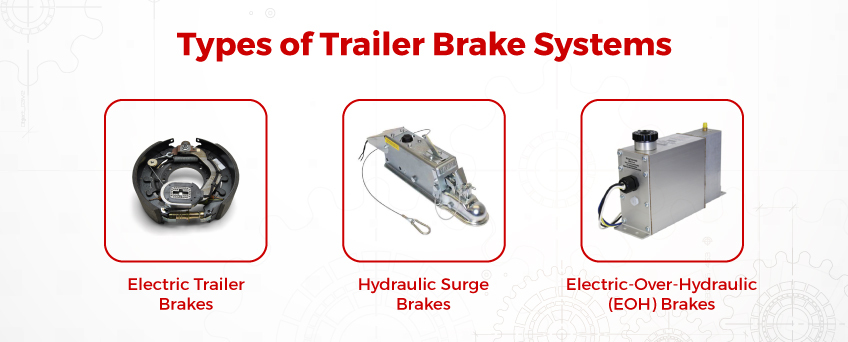Why Trailer Brake Systems Matter for Safe Towing
Safe and secure towing is a great responsibility. And one of its key contributing factors is the trailer brake system. Different types of trailer brake systems are available in the market with varying mechanisms, pros and cons, and applications. The right brake system for your trailer is the one that suits your requirements and fits exactly to the trailer and towing vehicle.
With the right trailer brakes, your vehicle's brakes are relieved from singlehandedly managing the trailer weight, ensuring more control over the vehicle. This helps you prevent incidents of swaying, jack-knifing, and fishtailing, improving brake performance. It is also a way to conform to state regulations on trailer brakes for vehicles exceeding a certain weight.
Let's continue this ride without applying the brakes.
Main Types of Trailer Brake Systems and How They Work
Electric Trailer Brakes
The brake controller installed in the towing vehicle controls the electric trailer brakes. When the vehicle's brakes are pressed, the brake controller receives electrical signals, which set the electromagnets in the brake drum in motion, causing friction that slows down the trailer.
Pros
They are compatible with many types of hitches and trailers, especially weight distribution hitches. These brakes have the flexibility to adjust the braking force for effective control over braking and stoppage. They are easy to use and maintain, and provide better control.
Cons
Their installation, involving a brake controller and wiring, is complex. You need to connect a wire between the trailer and the towing vehicle, increasing your maintenance needs and expenses.
Uses
They are mainly used for large trailers, including enclosed trailers, cargo trailers, and car haulers.
Hydraulic Surge Brakes
The trailer's momentum activates the hydraulic surge brakes. When you press the towing vehicle's brakes, it slows down. Due to the trailer's forward motion, the hydraulic actuator in the trailer's hitch coupler compresses the master cylinder. The high-pressure brake fluid flows through the hydraulic lines, activating the trailer brakes, which cause the trailer to slow down in tandem with the vehicle.
Pros
It is a simple structure, ensuring a proportional and smooth braking experience. Since they are hydraulic, they are best suited for boat trailers, ensuring effective braking.
Cons
They can cause trailer swaying. The hydraulic system might be slow in responding to the braking activity, causing delays in trailer stoppage.
Uses
Since potential braking delay is expected, they are generally used in light to medium-duty towing. They are best used for boat trailers or light-duty utility trailers. They are also useful when your tow vehicle has no brake controller installed.
Electric-Over-Hydraulic (EOH) Brakes
EOH brakes are a combination of hydraulic and electric trailer brakes. When the vehicle's brakes are pressed, the brake controller installed in the vehicle transmits electrical signals to the hydraulic pump, which pressurizes the brake fluid in trailer brakes. This sets the brakes in motion, gradually halting the trailer.
Pros
EOH brakes have a higher brake pressure, ensuring better control of the trailer. This feature makes them suitable for heavy-duty towing.
Cons
The combination of electric and hydraulic brakes lends a complex structure, resulting in time-consuming and expensive installation and maintenance.
Uses
These brakes are commonly used in heavy-duty towing, especially fifth-wheel trailers, due to more control.
Helpful Reads:
How Trailer Brake Systems Work: A Complete Guide for Safe Towing
Utility Trailers Explained: A Complete Guide to Uses, Benefits, And How to Pick the Best Fit
Fifth Wheel Trailer Sizes Explained: How to Choose the Right One for Transport Needs
Choosing the Right Brake System for Your Trailer
You can see the various types of trailer brake systems as discussed above. The right one for your trailer depends on the following factors:
Trailer Size and Weight
Trailer size and weight impact your decision on the right brake system for your trailer. This is because larger and heavier trailers need more braking force to stop them.
- For light to medium-duty towing, hydraulic surge brakes are the best. Their hydraulic feature also makes them suitable for boat trailers.
- For heavy and off-road trailer journeys, it is best to use electric or EOH brakes.
- Electric brakes are by far the most common type and are suitable for most cargo and open deck trailer applications.
Choosing the Right Brake System for Your Trailer
You can see the various types of trailer brake systems as discussed above. The right one for your trailer depends on the following factors:
Trailer Size and Weight
Trailer size and weight impact your decision on the right brake system for your trailer. This is because larger and heavier trailers need more braking force to stop them.
- For light to medium-duty towing, hydraulic surge brakes are the best. Their hydraulic feature also makes them suitable for boat trailers.
- For heavy and off-road trailer journeys, it is best to use electric or EOH brakes.
- Electric brakes are by far the most common type and are suitable for most cargo and open deck trailer applications.
Towing Vehicle Compatibility
Your towing vehicle's compatibility with the trailer brake system is also crucial. For this, you must check the vehicle's towing capacity and the hitch connection you will be using. These two aspects govern the load you can carry on the trailer, based on which you will need the brakes to stop it. If the vehicle supports a brake controller, electric brakes can fit.
Load Type
The cargo type you will carry affects your brake type decision. If you have sensitive cargo, use electric brakes for a smooth braking experience. If the load shifts during the journey, the braking force will be uneven, so use more stable brake systems. For any cargo related to marine or boats, use surge brakes to prevent corrosion.
Terrain
Any trailer brake system works in the case of flat terrain, so you can select the most cost-effective one. In the case of hilly or mountainous terrain, you need a stronger braking force. The best trailer brake system here is electric or air brakes. On steep inclines, these brakes control the braking force and ensure safety.
Common Mistakes When Selecting Brake Systems
You recognize the various types of trailer brake systems and factors affecting the right choice for your trailer. Still, buyers make the following mistakes when selecting the perfect trailer brakes:
- Ignoring the legal brake requirements makes you non-compliant. Braking laws vary from state to state in the US and depend on weight categories. Ignoring them means inviting fines or penalties and leading to uncontrolled and unsafe towing.
- Focusing only on the cheapest trailer brakes can lead to a wrong selection. By doing this, you compromise safety, brake performance, and brake longevity.
- Disregarding the maintenance requirements of trailer brakes is a critical mistake that costs a lot in the future. You must check the wiring, fittings, hydraulics, discs, drums, brake fluid, and other parts before any journey.
- Overlooking the key factors that affect the right choice of a trailer brake system is a blunder. You must factor in all the essential cost elements (towing vehicle compatibility, trailer size and weight, driving terrain, and load type) before finalizing the appropriate brake system for your trailer.
- Self-installation of the brake system is a common slip-up by buyers. It is a critical task requiring professional expertise; otherwise, it can lead to future monetary losses or accidents due to brake failure.
- Paying no heed to adjustments, quality checks, and brake testing can prove to be dangerous for lives and cargo. You must adjust the controller, test the working of the brakes, and check all components and connections. If ignored, you might encounter lock-up or weak engagement.
Conclusion
Installing the right trailer brakes for your trailer is a way to ensure safe and secure towing. It guarantees controlled driving, without harming the cargo, other vehicles, or people's lives. It also enables your compliance with legal requirements regarding trailer brake systems.
With different types of trailer brake systems (electric, hydraulic surge, EOH, and air brakes) available in the market, you must make the right choice for your trailer and towing vehicle. You must ensure the trailer brakes' alignment with the trailer, towing vehicle, hitch connection, cargo type, and terrain conditions.
If still doubtful about the right one for your towing needs, our team at Trailershowroom.com can guide you. We offer a range of trailer options, hitch connections, and braking systems packages. We help you choose the right option, and are always there to answer your queries.
Are trailer braking worries haunting you on the road? Worry not, when you have the best trailer brake systems to choose from at Trailershowroom.com.
FAQs
-
Q1: Does hitch type matter when selecting the trailer brakes?
Yes, hitch type matters because it connects the trailer to the towing vehicle. This connection affects the transfer of the braking force from the vehicle to the trailer. For example, if the hitch is heavy, you need electric brakes to ensure stronger control over the braking activity.
-
Q2: What is the difference between drum brakes and disc brakes?
Disc brakes consist of a disc and brake pads, where the disc or rotor is sandwiched between the brake pads. When you press the brakes, the brake pads squeeze the rotor and gradually slow down the movement, bringing the trailer to a halt.
Drums and brake shoes constitute the drum brakes. Shoes are inside the drum. When you apply pressure on the brakes, the shoes cause friction between the drum walls and gradually bring the drum rotation to a halt, stopping the trailer wheel.
You will find drum or disc brakes in all types of trailer brake systems - electric, hydraulic, and surge.
-
Q3: At what number should we set the brake controller?
A higher number on the brake controller indicates a stronger braking force. This number must depend on the trailer load capacity. If the load capacity is low, set it at a lower number, and keep increasing it as the load capacity rises.





